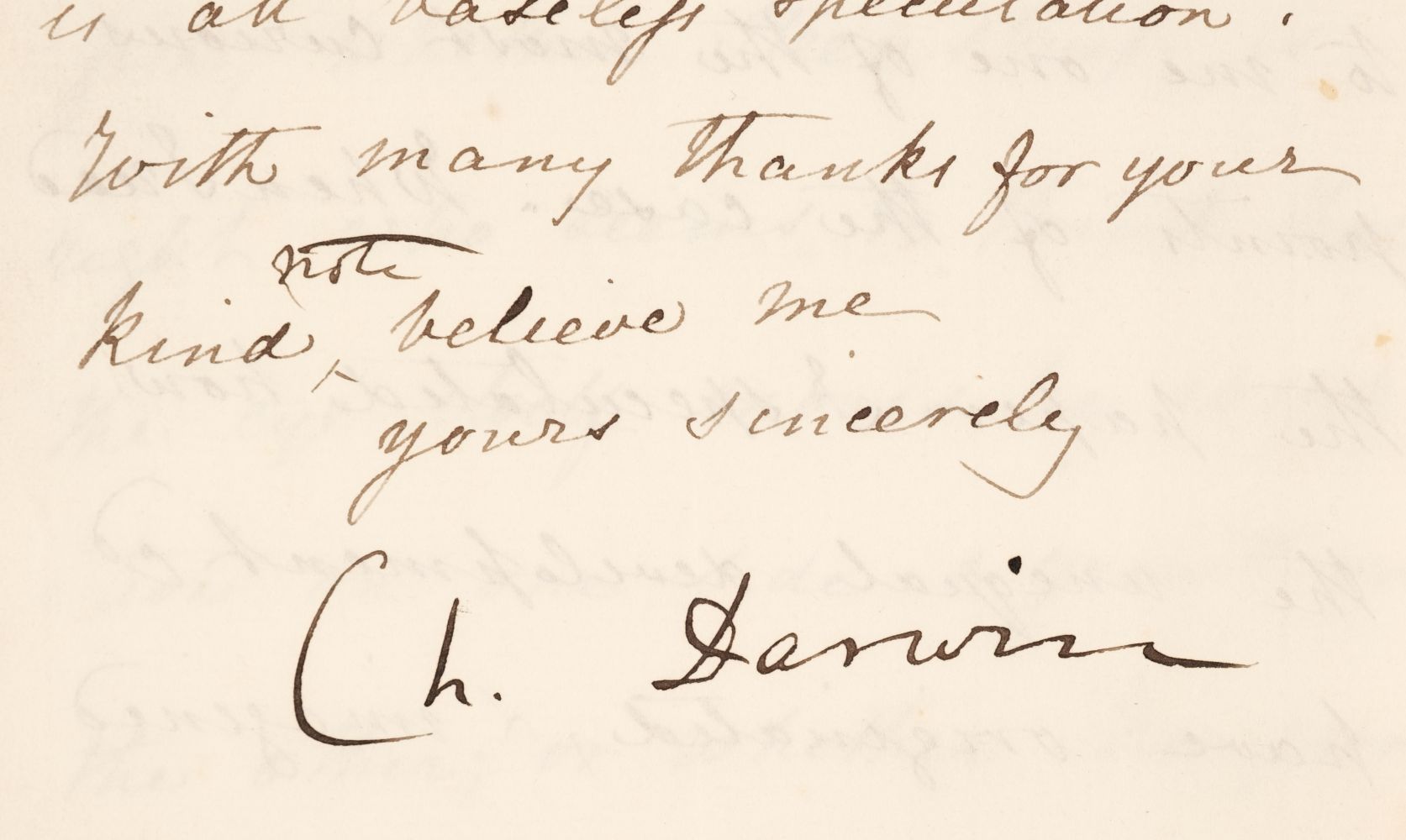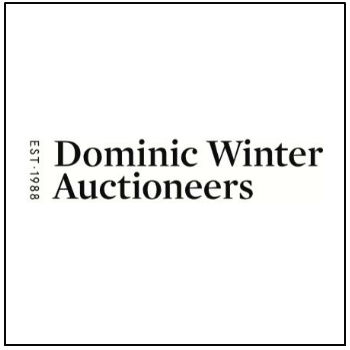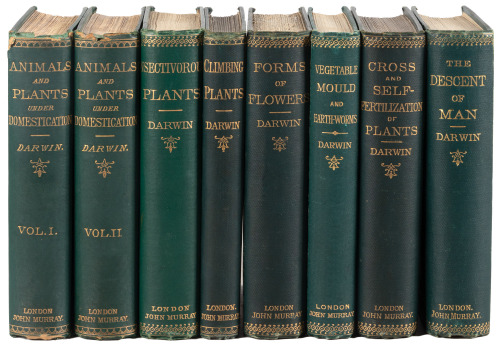CHARLES DARWIN (1809-1882), and other nineteenth-century scientists A collection of eighteen letters addressed to SIR WILLIAM HENRY FLOWER (1831-1899), comprising: Charles Darwin. Two autograph letters signed and one letter (in the hand of Emma Darwin) signed, Down, 24 September [1876], 19 May [1877] and n.d., together 7 pages, 8vo, 2 autograph envelopes, integral blank leaf . Thomas Henry Huxley (1825-1895). Four autograph letters signed and one autograph note signed, London, Eastbourne and n.p., 20 September 1872 - 24 November 1892, 10 pages, 8vo, 2 autograph envelopes . Alfred Russel Wallace (1823-1913). Two autograph letters signed, Grays, Essex and Parkstone, Dorset, 2 February 1873 and 11 July 1889, 6 pages, 8vo (slight spotting on letter of 2/2/1873). Sir Richard Owen (1804-1892). Autograph letter signed, Richmond Park, 9 May 1884, 2 pages, 8vo . Sir Joseph Hooker (1817-1911). Autograph letter signed, Royal Gardens, Kew, 31 October 1873, 3 pages, 8vo . Sir Charles Lyell (1797-1875). Letter signed, London, 23 March 1867, 12 pages, 8vo . Sir John Lubbock (1834-1913). Three autograph letters signed, Farnborough, 15 January 1891 - 3 November 1897, 9 pages, 8vo . Arthur Penrhyn Stanley (1815-1881). Three autograph letters signed, Deanery, Westminster, 24 January 1875 - n.d. [29 April 1878], 8 pages, 8vo . AN INTERESTING GROUP OF LETTERS OF DARWIN AND HIS CIRCLE, DISCUSSING THE ORIGIN AND CLASSIFICATION OF THE SPECIES, AND THE DIRECTION AND REFORM OF MUSEUMS AND SCIENTIFIC SOCIETIES IN VICTORIAN ENGLAND. Sir William Flower is chiefly known as director, between 1884 and 1898, of the Natural History Museum. His establishment of the museum, on the principle, derived from contemporary German practice, of providing not only comprehensive collections and research material for the specialist, but also exhibitions for the education of the public, may be said to have introduced the modern idea of the museum to this country. Flower was an active member of a number of other scientific organisations, most notably the Royal Society and the Zoological Society, of which he was president from 1879 to 1899. His best known scientific work was directed towards questions of classification. Flower's post at the Natural History Museum, and his involvement in learned societies, led him into contact with perhaps the greater part of the prominent scientists of his day. The correspondents in the present collection are drawn particularly from Darwin's circle: TH Huxley is famous as Darwin's disciple and defender, but Sir Charles Lyell was equally an influential friend and advocate: his Principles of Geology was second only to The Origin of the Species in its influence on contemporary scientific thought. Alfred Wallace, who independently reached the same conclusions as Darwin on natural selection, was the also co-author of Darwin's first paper on the subject; Sir Joseph Hooker, Director of Kew from 1865 to 1885, though unconvinced by natural selection until 1868, was nevertheless a lifelong correspondent of Darwin's; while Dean Stanley was perhaps the leading Anglican commentator on the origin of the species. The repeated subject of the present collection of letters is the identification and classification of species. A number of letters apply to Flower for information both practical and theoretical on the subject: so on the one hand Darwin, writing on 24/9/1874, forwards for Flower's opinion photographs sent by a Mr Van der Weyden, who is collecting fossil bones in Montevideo, commenting 'I want to encourage him in so good a work', and noting that he has collected 'a grand head of Toxodon'. By contrast Alfred Wallace enquires about Flower's theoretical work on the subject, assuring him 'It will be absolutely necessary for me to follow your classification, which I have no doubt will be the classification for a long time to come'. In a fine letter Charles Lyell discusses the problems of drawing a line of 'specific demarcation' between certain speci
CHARLES DARWIN (1809-1882), and other nineteenth-century scientists A collection of eighteen letters addressed to SIR WILLIAM HENRY FLOWER (1831-1899), comprising: Charles Darwin. Two autograph letters signed and one letter (in the hand of Emma Darwin) signed, Down, 24 September [1876], 19 May [1877] and n.d., together 7 pages, 8vo, 2 autograph envelopes, integral blank leaf . Thomas Henry Huxley (1825-1895). Four autograph letters signed and one autograph note signed, London, Eastbourne and n.p., 20 September 1872 - 24 November 1892, 10 pages, 8vo, 2 autograph envelopes . Alfred Russel Wallace (1823-1913). Two autograph letters signed, Grays, Essex and Parkstone, Dorset, 2 February 1873 and 11 July 1889, 6 pages, 8vo (slight spotting on letter of 2/2/1873). Sir Richard Owen (1804-1892). Autograph letter signed, Richmond Park, 9 May 1884, 2 pages, 8vo . Sir Joseph Hooker (1817-1911). Autograph letter signed, Royal Gardens, Kew, 31 October 1873, 3 pages, 8vo . Sir Charles Lyell (1797-1875). Letter signed, London, 23 March 1867, 12 pages, 8vo . Sir John Lubbock (1834-1913). Three autograph letters signed, Farnborough, 15 January 1891 - 3 November 1897, 9 pages, 8vo . Arthur Penrhyn Stanley (1815-1881). Three autograph letters signed, Deanery, Westminster, 24 January 1875 - n.d. [29 April 1878], 8 pages, 8vo . AN INTERESTING GROUP OF LETTERS OF DARWIN AND HIS CIRCLE, DISCUSSING THE ORIGIN AND CLASSIFICATION OF THE SPECIES, AND THE DIRECTION AND REFORM OF MUSEUMS AND SCIENTIFIC SOCIETIES IN VICTORIAN ENGLAND. Sir William Flower is chiefly known as director, between 1884 and 1898, of the Natural History Museum. His establishment of the museum, on the principle, derived from contemporary German practice, of providing not only comprehensive collections and research material for the specialist, but also exhibitions for the education of the public, may be said to have introduced the modern idea of the museum to this country. Flower was an active member of a number of other scientific organisations, most notably the Royal Society and the Zoological Society, of which he was president from 1879 to 1899. His best known scientific work was directed towards questions of classification. Flower's post at the Natural History Museum, and his involvement in learned societies, led him into contact with perhaps the greater part of the prominent scientists of his day. The correspondents in the present collection are drawn particularly from Darwin's circle: TH Huxley is famous as Darwin's disciple and defender, but Sir Charles Lyell was equally an influential friend and advocate: his Principles of Geology was second only to The Origin of the Species in its influence on contemporary scientific thought. Alfred Wallace, who independently reached the same conclusions as Darwin on natural selection, was the also co-author of Darwin's first paper on the subject; Sir Joseph Hooker, Director of Kew from 1865 to 1885, though unconvinced by natural selection until 1868, was nevertheless a lifelong correspondent of Darwin's; while Dean Stanley was perhaps the leading Anglican commentator on the origin of the species. The repeated subject of the present collection of letters is the identification and classification of species. A number of letters apply to Flower for information both practical and theoretical on the subject: so on the one hand Darwin, writing on 24/9/1874, forwards for Flower's opinion photographs sent by a Mr Van der Weyden, who is collecting fossil bones in Montevideo, commenting 'I want to encourage him in so good a work', and noting that he has collected 'a grand head of Toxodon'. By contrast Alfred Wallace enquires about Flower's theoretical work on the subject, assuring him 'It will be absolutely necessary for me to follow your classification, which I have no doubt will be the classification for a long time to come'. In a fine letter Charles Lyell discusses the problems of drawing a line of 'specific demarcation' between certain speci




.jpg)

.jpg)








Testen Sie LotSearch und seine Premium-Features 7 Tage - ohne Kosten!
Lassen Sie sich automatisch über neue Objekte in kommenden Auktionen benachrichtigen.
Suchauftrag anlegen